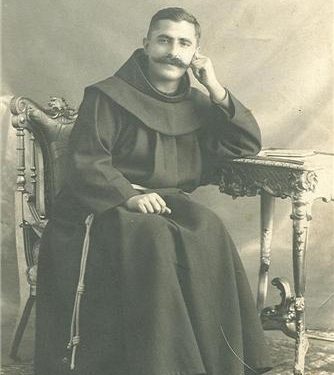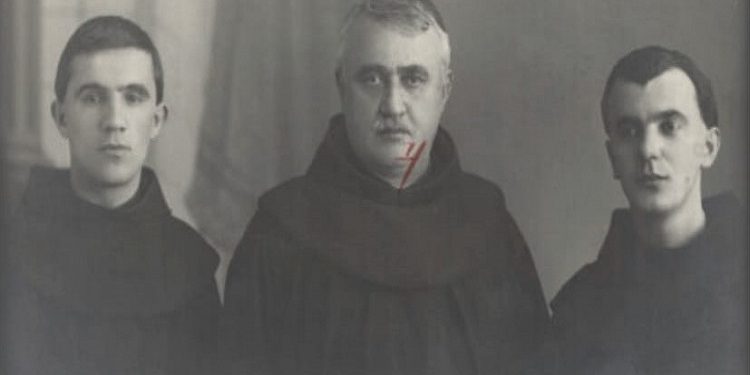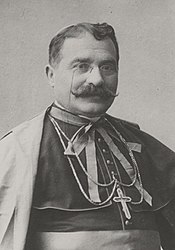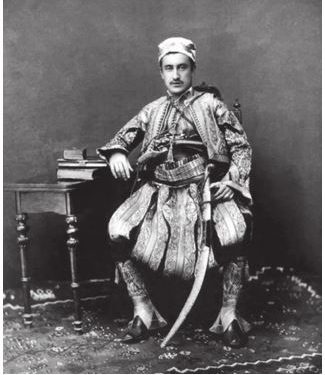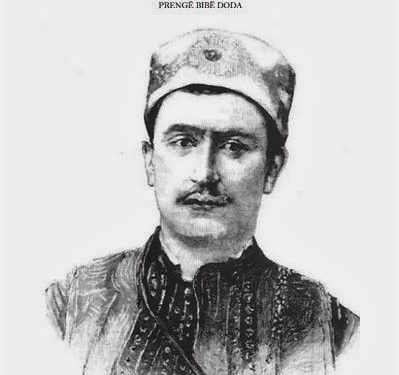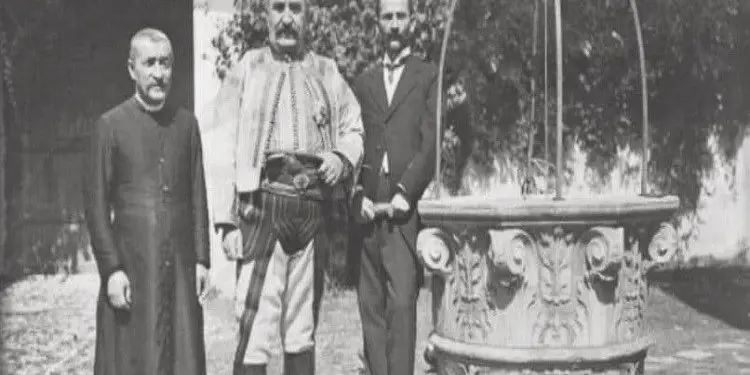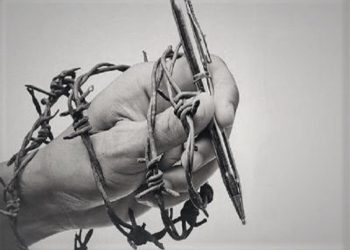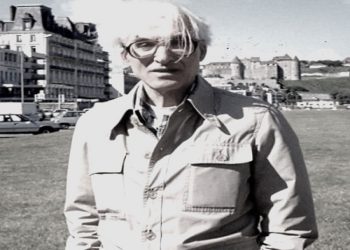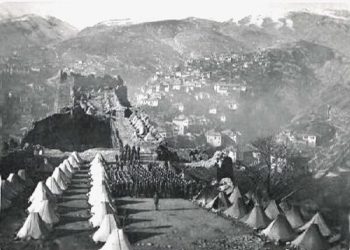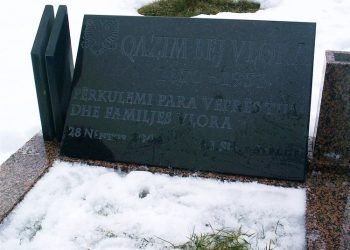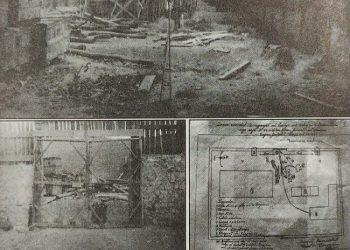By Dr. Nikol Loka
Part twenty three
“PRENGA BIBE DODA, THE SHADOWS OF A CITIZENSHIP”
Memorie.al / The newest book “Prengë Bibë Doda, a phenomenon in Albanian political life”, by researcher Nikollë Loka, not only expands the scope of historical studies on Mirdita, the Door of Gjonmarkaj and the figure of the Mirdita Prince, Prengë Bibë Doda, but it is also a contribution to national historiography. The very rich archival material, the literature used or consulted, oral traditions, etc., make this book a real study treasure, giving the science of history a scientific monograph that enriches our knowledge of Mirdita, its captains, tradition, history etc. Studying such an important and complex figure, such as the figure of Prengë Biba Doda, is a high scientific responsibility that not everyone undertakes. Nikollë Loka, has done a great job of research and treatment by the professional researcher, giving us the portrait of the Prince and the general Mirditor, with the true contours. Dr. Loka has adhered to the end of the space and time, in which the multidimensional events and their protagonists have developed.
THE MONOGRAPH “ABOUT BIBË DODA, A PHENOMENON IN ALBANIAN POLITICAL LIFE”, A VALUABLE SCIENTIFIC STUDY THAT ENRICHS THE FUND OF OUR HISTORICAL STUDIES
(By Mr. Sc. Murat Ajvazi, March 2017, Switzerland)
Continues from last issue
Prenga became a member of the Cabinet only in December and the cooperation with Ismail Qemali of the Provisional Government began a few months before he received the government portfolio. After Lezha, another meeting was supposed to take place in Lezha, or Shkodër. On August 30, 1913, in a letter that Luigj Gurakuqi addressed to Ismail Qemali, it is emphasized that; the entire population of the North will gather in Shkodër or in Lezhë, to pledge their allegiance to the Provisional Government: “Everyone has a desire for peace, for unification”. Mirdita joined the Albanian Government in September, in the presence of Prengë Bibë Doda, and on this occasion, blood was shed. (468)
In the service of national unity, Ismail Qemali had thought, together with Prengë Bibë Doda, to make a working visit to Shkodër. From the correspondence of the Consul of Austria-Hungary with Vienna, we learn that; “Luigj Gurakuqi, who was in Rome, had submitted a memorandum to Marquis San Giuliano, where it was a matter of quietly or semi-officially recognizing the provisional government of Vlora, and favoring Ismail Qemali and Preng Bib Doda’s trip to Shkodër , as they want to cooperate with the commander of the international troops in Shkodër”. (469)
In the wake of these efforts, there is also the telegram that on October 20, 1913, Ismail Qemali sends to the Club “National Union” in Shkodër, where he invites its members to “give opinions on agreement and union”. (470)
It seems that the rapprochement between Prenga and the representatives of the Government of Vlora has been natural and friendly. “When Prengë Bibë Doda came to Shkodër, where all the people were eagerly waiting for him, and where there were great honors, our mature agreements became more mature and friendly. Day after day, large meetings were held, here in the club of Shkodra, here in the house of Prengë Bibë Doda, and in all the talks that were held, the desire for peace, for union, for connection was clearly seen…”!
The biggest and highest factor of the union and agreement in the Shkodra side is today the honorable Prengë Bibë Doda of Mirdita, who, in addition to the name of honor that he has everywhere in those places, also has a reasonable way, that brings closer, connects and unites”. (471)
International interest in Biba Doda was not affected by his presence in official positions, as he was considered one of the politicians with a future in Albania. On August 25, just two weeks after arriving in Shkodër, he organized an official reception ceremony, in honor of the Italian-Albanian soldiers, of the Italian detachment in the presence of Admiral Patrio, the Consul General, Galli and the border commissioner, Mr. Nataflni. (472)
Prenga became Deputy Prime Minister only on December 25, 1913, and on that occasion, Ismail Qemali, charged him with the problems of the North of the country. Against this decision, Austria-Hungary protested, for which Captain Gjonmarkaj was unacceptable, as he wanted to declare the “Catholic Principality of the North”. In the relation to the Foreign Ministry in Vienna, the Austro-Hungarian Petrović, of the International Control Commission, writes: “Prengë Pasha, it will not be possible practically in the Government, to exert any hostile influence on us”. (473) Austro-Hungarian diplomatic sources write that; “On January 6, 1914, Prengë Pasha left for Vlorë”. (474)
There is a possibility that it will also be the official date of the start of work, as Deputy Prime Minister. The political situation in this period is permeated by a general spirit of reconciliation. Prengë Pasha skillfully used the existing situation, transforming it from a spontaneous situation that was suspended, into a powerful movement for the unification of all the Catholic villages of Upper Albania. Meanwhile, there was no shortage of objections.
The supporters of Esad Pasha among the highlanders of Shkodra, sought to keep the northern territories separated from the Provisional Government. There was also a prominent patriot who took his disagreements with Ismail Qemali to such a degree that he connected with Esad Pasha. The Austro-Hungarian Consul in Shkodër, Zambaur, announces from Kastelnovo, Minister Erental, that; “Faik Bej Konica and Dervish Hima have come to Shkodra and are openly making propaganda in favor of Esad Pasha, against the Provisional Government of Vlora and especially against its representative, Preng Pasha. (475)
This attitude of two prominent patriots of our National Movement seems strange, but in order to evaluate the attitudes of Albanian politicians then, one must also look at their personal relationships. Apparently, Konica and Hima’s relations with Ismail Qemali were not good and they were going to Esadi, as they say; “to spite him”.
In the name of understanding, unity and fraternization of Albanians, Prenga secured great support for his project and the authority he had among the people increased a lot. According to Zambaur; “”an opposition against him, would be incomparable to him, wherever it comes from”. (476)
But Prenga moved on two planes, as a representative of the union of all Albanians, regardless of region and religion, but also for the union of Catholics, among themselves. We remember that until that time, the provinces had led a closed economic and social life. The union of the Catholics was desirable, but too pronounced; it was not good for the general climate of national unity, while it served the political future of Prenga. A “Catholic policy” was harmful especially in the city of Shkodra, where efforts were being made for unity and understanding between citizens with different religious beliefs, in the conditions of a delicate balance, which could be broken by an ill-considered action of the politicians.
This is the reason that very soon, Austro-Hungarian diplomacy intervened to prevent the political action on religious grounds that Prenga was doing, putting pressure on him to withdraw from the union of Albanians on religious grounds.
As soon as he returned to his homeland, Prenga thought of taking action against the Serbs in his native village; a Serbian detachment was stationed on Orosh. We remember that once, Prenga himself, had made an agreement, by which; “Serbs would pass through the Mirdites, to fight the Turks and then retreat.” According to the Austro-Hungarian diplomatic sources: “The news coming from Mirdita, says that Prengë Bibë Doda, together with the Bajraktars of the country, have decided to oppose with arms, an invasion of Albania by the Balkan states”. (477)
Since the Serbian forces were in large numbers, “the pretensions of the Mirditas to attack them seemed impossible, not only because of the lack of weapons.” (478)
The situation with the Serbs had not passed without incident; the mountaineers of Fan had exchanged shots with the Serbs. Prengë Pasha, sent representatives to the Serbian commander and received the following explanations: “The Serbian army does not intend to fight with the Albanian Christians, but only against the Turks (read: the Muslim Albanians). (479)
However, in this period, Prenga had taken an anti-Serb stance, but did not have the necessary forces to act against them. At the end of its mandate, the Young Turks and their unchanged policy towards Albania became a concern for the Government of Vlora, even though the realities were quite different. From Istanbul to Albania, Young Turk agents and suspicious persons were infiltrating, working on their behalf. 202 committee members and 6 officers were found during the inspection of Llojd’s steamer, “Meran”. At the request of the Provisional Government, the steamer continued to Trieste, from where it traveled to Istanbul. (480)
At the head of these forces was an Albanian soldier named Beqir Grebeneja. The event shortened the remaining days for the Government of Vlora. After Beqir Grebene’s conspiracy, the International Control Commission concentrated all power in his hands, forcing Ismail Qemali to resign on January 22, 1914. (481)
Ismail Qemali and Prengë Bibë Doda worked only three weeks together, but from the documents that come from that short period it appears that their relationship was very friendly. Sejfi Vllamasi, speaking about the governance of that period, considers Prenga; “distinguished patriots and supporters of Ismail Qemali”. (482)
The proof of loyalty to the Prime Minister can also be seen in the answer that Prenga gives to Esad Pasha, regarding the proposals he made to overthrow the government of Vlora and Ismail Qemali. Esadi wrote to Prenga: “As the Minister of the Interior, I came to work in Durrës, because Ismail Qemal is not to be worked with. So come and talk about a Turkish prince”. Prengë Biba Doda’s answer was: “I don’t think it’s reasonable for a new government to be established in Durrës, because it makes a bad impression on the outside world, to the detriment of Albania, just as I would like a new government to be established.” in Mirdita, like Gjeto Coku, dreamed of lifting it to Lesh, which discredits us abroad. I think and I invite you as the minister of the Government of Vlora and me as the deputy prime minister, to gather together and discuss through legal means”. Unable to have him with him, Esadi requested that at least Prengë Biba Doda remain neutral. (483)
Another proof of Prenga’s loyalty to the Elder of Vlora is his attitude after the resignation of Ismail Qemali. When Ismail Qemali had left and was living in exile, Prengë Bibë Doda and his friends decided to send a commission composed of Sheh Musa Prizren and Dan Hasan, to Nisa, France, to pray on his behalf and that of Bajram Curri to come to Lezha, to set up the government of Vlora again, after Shkodra was occupied by international powers and the policy of Esad Pasha had to be opposed. Ismail Qemali, who was closely following the situation, through two messengers, had given them the answer: “My sons, Albania loses with blood, therefore we must avoid blood. Kiss me Prengë Pasha and Bajram Curri”. (484)
The cooperation of Preng Pasha with Ismail Qemalin, against Esad Pasha, in December 1914, is also mentioned in the Italian diplomatic documents. Taking the high position of Deputy Prime Minister of the Government of Vlora, for a short time, for the Prince of Mirdita had more symbolic meaning. Mirdita had fought to preserve its freedom and had made countless sacrifices, until the declaration of Independence. Regardless of the special status they had, the Mirditas joined the uprisings that broke out in Kosovo in 1910 and in the 1912 uprising; they were in agreement with Central Albania. The appointment of the Captain of Mirdita, as Deputy Prime Minister, was an appreciation for the people of this Province, for his sacrifices and contributions.
Candidate for the Royal Throne of Albania
Considering his family background and the role he had played as an important political figure, Prengë Bibë Doda, prepared to present his candidacy for the Royal Throne of Albania. His political movements during this period had led some diplomats to predict that he was claiming the Throne of Albania. “There is a possibility that the prince (Prengë Bibë Doda) will be elected as a contender by the National Assembly. The Albanian pretender, Prince Prengë Pashë Bibë Doda, did not continue his trip to Albania. He stayed here, until a few days ago, to then return to Rome”. (485)
While in another Austro-Hungarian diplomatic relationship, it is written: “Prenga Bibë Doda, has ambitions for the post of President of Albania. There is talk of a meeting of his with Abbot Doçin, in Tivar, which has not been held yet”. (486)
Among the many contenders, only he and Esad Pasha lived in Albania. In order to be a strong candidate, Prenga had worked to unite the Catholic population and present himself as the proposal of all Catholics in the country, but this way of treating the Crown, which represented national unity, was strongly opposed by Vienna. In a meeting in 1913, the primacy of the mountains of Dukagjin and Mirdita agreed to recognize him as their head, (487) empowering him even more politically, but alienating him even more from the Austro-Hungarians.
His supporters also used the press to increase Prenga’s influence on the people. In the newspaper “Besa Shqiptare”, an article was published, in which propaganda was made for the appointment of Prengë Bibë Doda, “Prince of Albania”. It is said that this article was inspired by the Italian-Albanian professor, Zef Skiroi. (488)
Among the efforts of Prenga towards the realization of this objective, we mention the Assembly of Lezha. In a letter from Shtjefën Gjeçov, dated September 17, 1913, addressed to Gjergj Fishta, there is talk of that assembly, which was held on September 7, 1913, where the proposal came out that Prenga should become the Prince of Albania./Memorie. al
The next issue follows
- New Albania, No. 25, September 28, 1913, p.2
- Ismail Qemali (summary of documents), General Directorate of State Archives, Tirana, “November 8”, p.314.
- Ismail Qemali (compilation of documents), p.314
- The Provisional Government of Vlora and its activity.
- HHStA-PA-VJ.-23-10-1066. No. 20, Shkodër on August 23, 1913. Report of Consul Mayerhauser – Count Bertald, Vienna.
- Petrovic’s report to the Ministry of Foreign Affairs in Vienna, Vlora, December 1912
- HHStA-PA-A, Year 24-33-3379
- Luigj Martini, Prince without a crown of Mirdita,… p.218
- HHSTA PA A, Year 23-15-1587 Code telegram of Consul Zambaur sent to the Minister of Foreign Affairs, Count Berchtold in Vienna, Katelnovo August 16, 1913
- HHStA-PA-A-Vj, 23-12-1235, Antivari January 6, 1913
- HHStA-PA-A-Vj, 10-1082, Report of the Austro-Hungarian Consul in Shkodër to the Ministry of Foreign Affairs in Vienna, August 28, 1913
- Luigj Martini, Prince without a crown of Mirdita, …,p.225
- HHStA-PA-A, Year 24-11-1180
- Esilda Luku, European Diplomacy and Albania in the period between the two peace conferences (1914-1919-1946, dissertation, Tirana 2012, p.X-XI
- Sejfi Vllamasi, Political encounters in Albania, “Neraida” publishing house, Tirana 1995, p.51483. Sejfi Vllamasi, Political confrontations in Albania,… p.59
- Sejfi Vllamasi, Political confrontations in Albania… p. 60
- Notice from the Austro-Hungarian diplomatic representative in Bari to the Minister of Foreign Affairs, Count Berchtold, regarding the cancellation of the trip to Albania, of Prengë Bibë Doda, No. 21/politik, Bari, on November 28, 1912, Albania in the Austro-Hungarian Documents (1912) Volume VI, prepared by: Marenglen Verli, Ledia Dushku, Albanological Publications, 2012, Center for Albanological Studies, Institute of History, Tirana, p.372
- HHStA-PA-A-Vj, 23-12-1237, Telegram No. 4 of diplomat Ledinegg to the Ministry of Foreign Affairs in Vienna, January 12, 1913
- AQSH, Fund 50, File 2, p.1 488. HHST-PA-Vj.23-5591, Radio-telegram code No.69 from Majerbausout. Ref. I.V. Dept. V. No.281, Kastelnuovo to Shkodër




